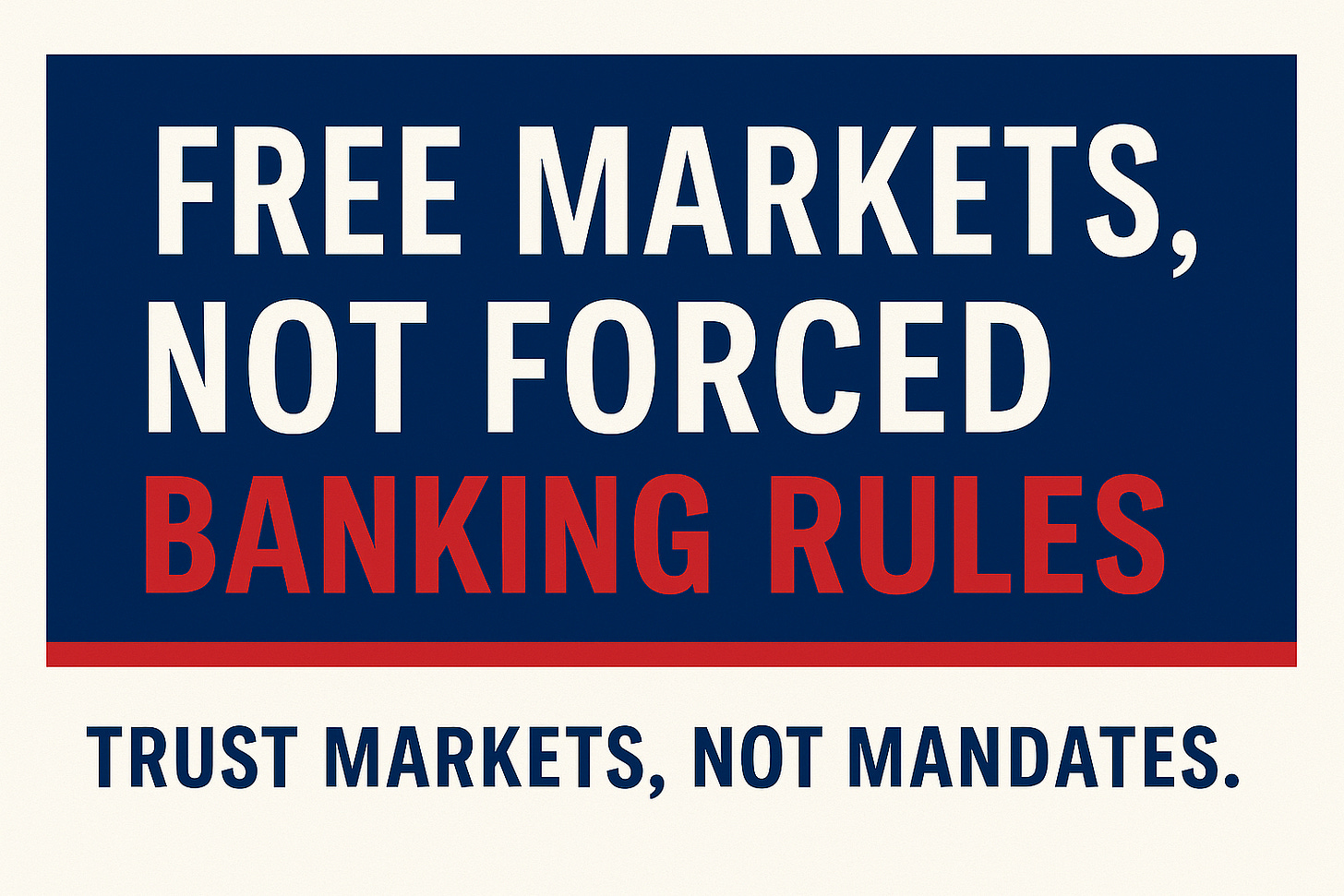Stop Forced “Open Banking”: Reject the CFPB’s Section 1033 Rule
Mandates don’t empower consumers—they waste resources, risk privacy, and entrench big players.
Hello Friends!
Imagine being told to build a billion-dollar bridge before the city decides where the road is going. That’s exactly what America’s banks are facing under the CFPB’s Section 1033 “open-banking” rule.
This month, banking groups warned that the CFPB’s deadlines—beginning in April 2026—will force them to pour time and money into compliance systems for a rule already in legal limbo. (Consumer Finance Monitor has the details in the source link under the paywall.)
This is bureaucracy at its worst: compliance before certainty, costs before clarity.
What Section 1033 Really Is
Section 1033 of Dodd-Frank sounds harmless: consumers should be able to access their own financial data. Who could argue with that?
But under President Biden’s CFPB Director Rohit Chopra, that idea became a sweeping mandatory data-access regime. Banks must build APIs, grant broad third-party access, and maintain complex compliance systems.
Supporters—including fintech lobbyists—say it will empower consumers and spark competition. But history tells us otherwise: government mandates don’t create innovation; they create red tape, rent-seeking, and regulatory capture.
Why Banks Are Fighting Back
The lawsuit filed by the Bank Policy Institute and state associations isn’t just whining—it’s highlighting the economic flaws:
Massive compliance costs. Community banks and credit unions will bleed resources building systems they don’t need, raising costs for families in higher fees and fewer services.
Legal limbo. A federal court already stayed enforcement, and the CFPB itself has admitted it’s planning a rewrite (JD Supra). Why invest billions in infrastructure for a rule that might not survive?
Arbitrary deadlines. Tiered rollout from 2026 to 2030 punishes smaller banks based on asset size, not readiness. It’s government deciding winners and losers.
Privacy risks. Mandated data pipelines expand attack surfaces and blur liability. Who pays when a fintech mishandles consumer data? Consumers will sign endless “I agree” forms, but consent fatigue is not empowerment.
And as the Bloomberg Law coverage of the JPMorgan-Plaid deal shows, the real beneficiaries are big players jockeying over who controls and monetizes your data—not the customers they claim to serve.
Bad Economics, Plain and Simple
From a free-market economist’s lens, Section 1033 is flawed at its core:
Regulated innovation is fake innovation. Standards set by regulators advantage big incumbents. Smaller innovators get shut out.
Moral hazard is built in. When fintechs don’t bear full liability, misuse is inevitable.
Capital is misallocated. Banks should be lending, improving services, and investing in communities—not wasting billions on compliance armies.
Regulatory creep is guaranteed. Once the pipes exist, Washington will demand more: new data types, longer retention, deeper reporting. Bureaucracies never shrink.
This is exactly what I outline in my Finance Policy Guide: regulation doesn’t just fail to solve problems—it creates new ones by distorting incentives and protecting insiders.
The Trump Opportunity — Reject & Repeal
This bad rule was born under President Biden’s Chopra CFPB. Now President Trump has an opportunity:
Step 1: Kill the Section 1033 rule. Don’t delay, don’t rewrite—reject it.
Step 2: Confront the root cause: Dodd-Frank. That law handed unelected bureaucrats sweeping discretion over credit, compliance, and now consumer data. It has crushed community banks and entrenched Wall Street giants who can afford compliance.
Rejecting Section 1033 is just triage. Rolling back Dodd-Frank is the cure.
A Better Way to Empower Consumers
Real reform doesn’t start with coercion—it starts with markets. Here’s the alternative:
Incentive-based portability. Reward voluntary data sharing by lowering liability risks for firms that empower customers.
Controlled pilots. Allow opt-in frameworks with strict privacy protections, then scale what works.
True consumer rights. Focus on transparency, revocation, and damage remedies—not “click to consent” box-checking.
Sunset rules. Any mandate should expire unless it proves measurable consumer benefit.
That’s how you empower individuals: by trusting markets, respecting choice, and demanding accountability.
My Take
The CFPB’s Section 1033 rule is a Trojan horse: marketed as “empowerment,” but in practice it will raise costs, weaken privacy, and entrench incumbents. Families will be left with fewer choices, higher fees, and more exposure of their private data.
President Trump should take this moment to reject Section 1033 outright and begin dismantling the failed architecture of Dodd-Frank. That’s the path to a financial system rooted in freedom, innovation, and prosperity—not bureaucracy and capture.
Keep reading with a 7-day free trial
Subscribe to Let People Prosper to keep reading this post and get 7 days of free access to the full post archives.

